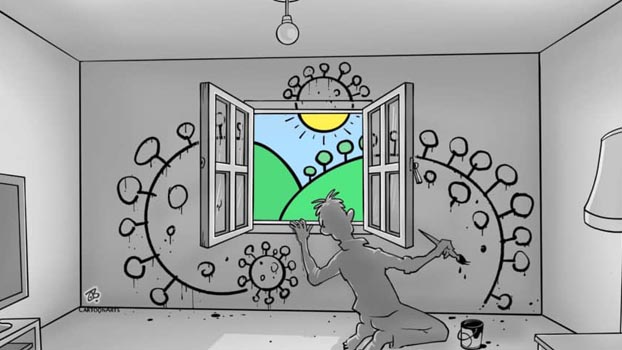Recovering from Covid-19: The risks we must anticipate to build back better

Emilio Granados Franco
A golden rule of politics is that the timing of a decision is almost as important as the decision itself. “Timing is everything,” but it is also the element that is hardest to get right.
The world has long been overdue a systemic reform of its economic, social and technological structures, but apparently the timing has never been quite right. Growth has been slow, political divisiveness on the rise and geopolitical relationships ever more fragile. All of this, while inequality has increased and has magnified a multitude of social problems.
The global COVID-19 crisis has exposed these gaps with graphic honesty. It makes for an uncomfortable reflection as we see the woefully unequal access to health care, digital means and social protection as the pandemic spreads across cities, countries and continents.
A virus has taken away the luxury of planning. We can no longer wait for the right moment to time such reforms, but we can still make sure they are the right ones. There are critical decisions that we can make today that will have long-term implications. As governments relax containment measures and economies begin to reopen, it is vital that recovery efforts consider the second-tier risks resulting from COVID-19.
Following the great lockdown will come the great transformation, a series of profound changes to what is already being described as the “old normal.” If we remain passive to emerging risks, we may lose a historical opportunity to shape the new normal that we want, rather than the one we will be left with.
The World Economic Forum asked 350 of the world's top risk experts to assess the most likely and most concerning fallout risks from COVID-19 over the next 18 months, for the world and for companies. The results of this survey are now in the forum's COVID-19 Risks Outlook.
Economic risks dominate perceptions. Two out of three experts identified a prolonged global recession as a top concern. Half identified bankruptcies, industry consolidation, failure of industries to recover and a disruption of supply chains as crucial worries.
Critical noneconomic risks are also concerning. Half of the respondents are particularly worried about an increase in cyberattacks against their companies and expect restrictions on the cross-border movement of people and goods to remain up to 2021, while 40 percent believe another outbreak of an infectious disease is a major risk for the world.
Rightfully so, the state of the economy is critical, but the implications from the crisis are far more complex.
On the environmental front, even with an expected 8 percent drop in global emissions for this year, the world would still miss the 1.5-degree Celsius target to avoid a planetary catastrophe. Climate degradation will worsen if countries fail to embed sustainability criteria into their recovery plans, and if COVID-19 eclipses sustainability on the public agenda.
Social anxieties are another concern. Widespread anxiety could worsen as a result of entrenched unemployment, inter-generational friction and the pressure that fear and isolation have put on mental health.
One recent study in the United States, for example, found that social distancing risks increasing suicide rates. Another found that 70 percent of American adults feel this period has been the most stressful of their careers. Moreover, today’s youth is facing a much bleaker economic outlook than following the 2008 financial crisis. “Generation Great Lockdown” — or the class of 2020 — is indeed at risk of becoming the next lost generation.
The relationship between societies and technology is also likely to change fundamentally. Technology has been critical to contain the spread of the novel coronavirus, maintain communication with families and enable working from home. But a hasty adoption of digital solutions — from videoconferencing to tracing apps — also risks a mass increase in cybercrime, civil liberty violations and deeper digital inequality.
This is an outlook of emerging risks; it is not a forecast. In this respect, it serves as a warning of how things could turn out if handled poorly, but more importantly it offers a means to change direction before it is too late.
The crisis has exposed weaknesses, but it has also illuminated strengths. There is a newfound understanding and appreciation for essential public services, most notably health. Consumption and mobility habits have changed dramatically — a sign of adaptability toward a more sustainable model — while technology has potentially revolutionized learning, working, producing and caring. We must draw on these strengths to build back a better world.
The World Economic Forum has also published a collection of essays from its diverse Global Risks Advisory Board about opportunities in the post-COVID-19 world.
These include a renewed support for the multilateral system and its organizations, regional integration to respond to global trade disruptions, opening spaces for cities to participate in shaping the global agenda, creating public-private insurance schemes that are accessible to the most vulnerable groups, and embedding mental health awareness into public education programs.
The coronavirus spread so wide and so fast that this crisis seems to have been one step ahead of us. It’s time to take the lead.
Emilio Granados Franco is head of Global Risks and Geopolitical Agenda at the World Economic Forum.
Source: Japan Times



